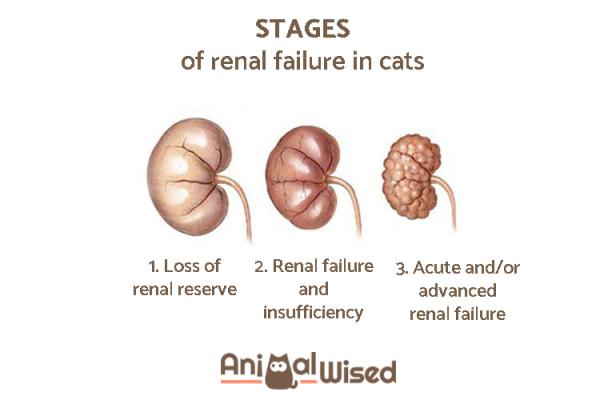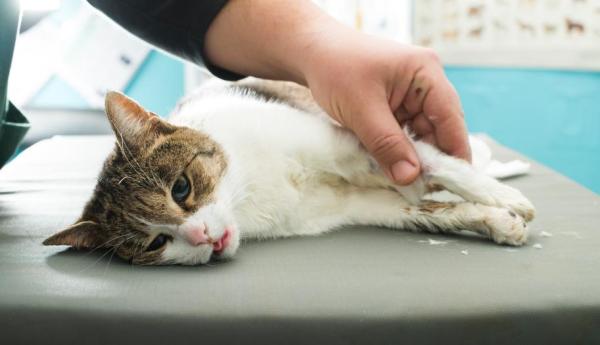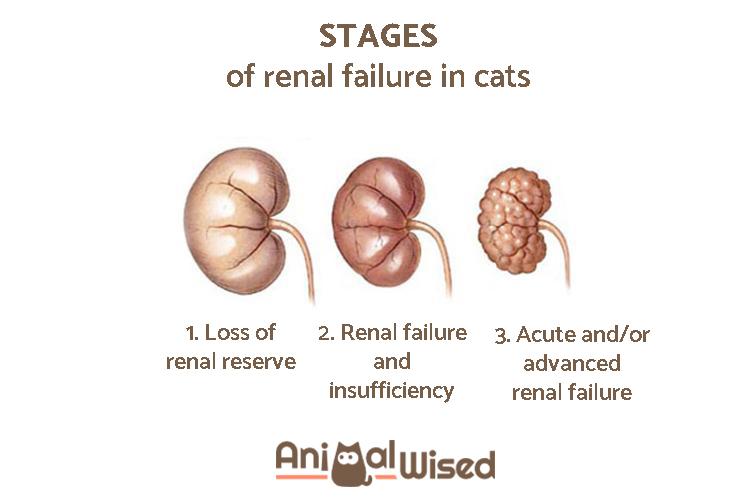How Long Does a Cat with Kidney Failure Live?



See files for Cats
Kidney failure in cats is an unfortunately common disorder. This is especially the case with older cats. Another term for this condition is renal failure and, while it may have different causes, they all amount to the same thing. Your kidneys no longer function properly. This can be a chronic disease or you might have an acute condition which causes the damage. In both cases it will require veterinary management with the right after-treatment, specially formulated diet and periodic reviews.
However, kidney failure can only be managed and not treated (with the exception of the usually prohibitively expensive organ transplant). This leads to the understandable question of how long does a cat with kidney failure live? The life expectancy of a cat with renal failure depends on certain variables. AnimalWised details these factors so that you can look for an answer with your cat.
Renal failure in cats
Generally speaking, renal failure means a malfunctioning of the kidneys and it can affect only one or both at the same time. One of the most unfortunate aspects of kidney damage is that it can take a long time to make itself known to us. The body enacts compensatory mechanisms which try to keep the organ functioning as well as possible despite this damage.
By the time we might begin to experience the symptomatology of kidney failure, the damage may already have been done. Renal failure can occur suddenly and acutely with symptoms which may include vomiting, anorexia, dehydration and hypertension. If left untreated, a cat will die. Other times, renal failure occurs chronically and leads to our cat losing weight and vomiting, but will most commonly manifest i dehydration despite a large uptake of water. It will also require veterinary treatment, but it should not lead to an imminent fatality if caught early enough.
To detect kidney failure, a blood test can be performed. It is also possible to detect it with a urine test and ultrasound. With this data, the vet can qualify in what stage is the disease. The right course of treatment will depend on this diagnosis.
In acute renal failure, the main thing is to help recover the animal as best as possible. Once the resultant damage has been assessed a treatment plan can be created. As kidney failure cannot be cured, improving a cat's quality of life is the best way to extend life expectancy. This treatment will not be localized to the kidneys as it has progressive consequences throughout the body and it is this deterioration which results in death.
Since the symptomatology can appear only when the disease is already advanced, it is essential that we submit our cat to a review every 6 to 12 months. This is especially important after 7 years of age as the disease is most prominent in older cats. The sooner treatment is commenced the longer the life expectancy.

Factors to consider with renal failure
We must begin by stating that it is impossible to determine exactly how long a cat with kidney failure will live. There are variables which are impossible to account for. For this reason, we will look at the factors we do know affect longevity in cats with kidney problems so that we may best estimate life expectancy. These include:
- Acute or chronic renal failure: an acute presentation of renal failure can be fatal in a matter of hours. It is only when the progress is halted that treatment can begin. However, chronic renal failure lasts over a long time and, with management, a cat can still maintain a good quality of life for years to come.
- Stage of the disease: only a vet will be able to classify which stage of kidney failure in which the cat is found. They will be able to take into consideration various factors such as symptamtology and phosphorous levels. Based on these indicators, the disease will be more or less serious and the impact on life expectancy will relate accordingly. Cats in lesser stages of advancement will, generally, live longer than cats with advanced kidney failure.
- Treatment: this will consist of a specific diet for cats with kidney failure as well as medication, the prescription determined by the severity of the condition. If the treatment is not maintained, it can reduce life expectancy.
- Behavior of the cat: if the cat refuses to eat certain food or makes it impossible to administer the medication, then its life expectancy will like decrease. This could be due to age, weakness or psychological trauma. At this point we will need to consider whether continuing with treatment is in the best interests of the cat or if it will seriously deplete their quality of life.
- Other problems: if a cat has other problems or diseases which have can be exacerbated by kidney disease or which simply will also affect their life expectancy, then they will understandably live shorter lives.
Life expectancy
Since we cannot give an exact figure on how long a cat with renal failure will live, due to unpredictable factors, we can point out the stages which will have a bearing on life expectancy.
- For cases of acute renal failure, the first 24 - 48 hours are crucial. If there is improvement, usually seen when the symptoms somewhat subside, the animal may begin to eat and can potentially start fluid therapy. They may even require intravenous medication. The cat may have recovered from the acute failure, but it will most likely follow with chronic kidney failure.
- With chronic renal insufficiency, life expectancy will depend on the stage of the illness at which the cat is in. This means a cat can live for only a few months or up to a few years.
If a feline is in the terminal phase with no chance of recovery, the vet may recommend euthanasia. This is because cats with advanced stages of renal failure can be subject to much pain and suffering. Cats in the terminal phase can experience serious discomfort during their days close to death, preventing them from carrying out basic daily routines.
This is not an easy decision to come to. It is understandable that many people may want to do everything they can to make their cat live longer. Unfortunately, prolonging the life of a cat with renal failure can be cruel. Their suffering can be acute and we may not have the understanding and/or resources to treat them properly. In these cases, euthanasia may be the most humane course of action.

This article is purely informative. AnimalWised does not have the authority to prescribe any veterinary treatment or create a diagnosis. We invite you to take your pet to the veterinarian if they are suffering from any condition or pain.
If you want to read similar articles to How Long Does a Cat with Kidney Failure Live?, we recommend you visit our Other health problems category.






 My Cat Daisy is 8 years old was just diagnosed with Chronic Kidney Failure. Her Vet suggested IV fluids and diet for 3 days then a blood test to see if she is responding to it? Went in for a sore on her head and got told that.
My Cat Daisy is 8 years old was just diagnosed with Chronic Kidney Failure. Her Vet suggested IV fluids and diet for 3 days then a blood test to see if she is responding to it? Went in for a sore on her head and got told that.



